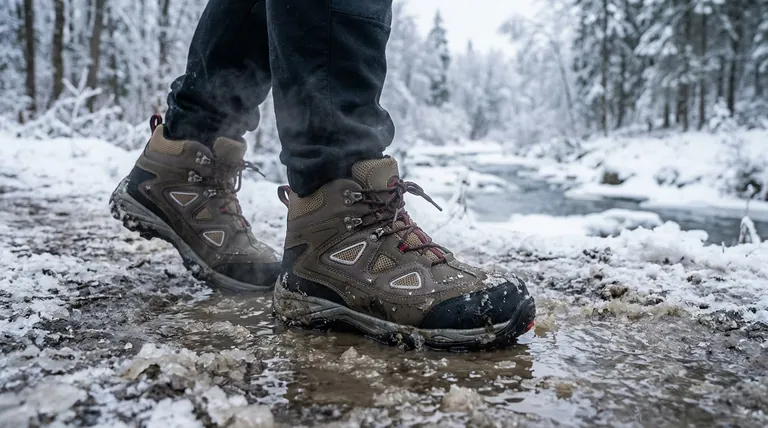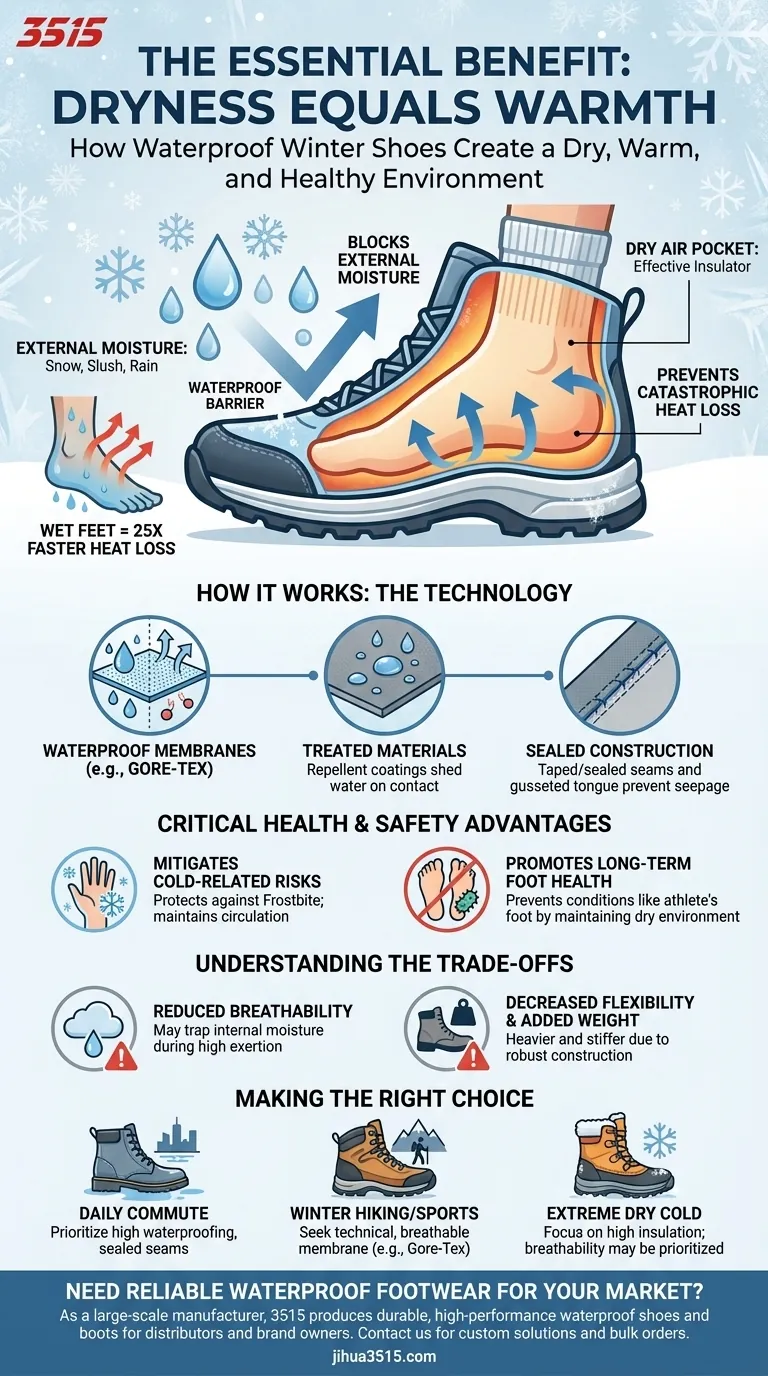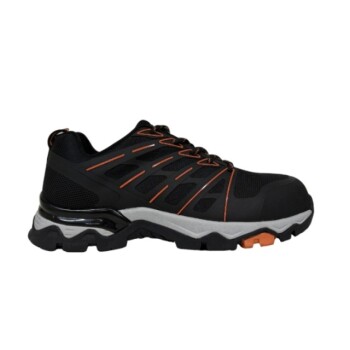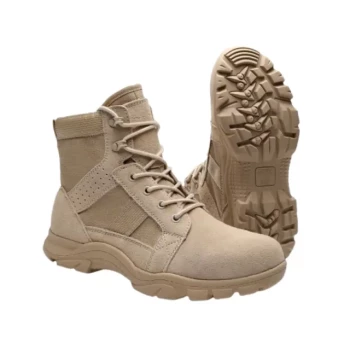The primary benefit of waterproof winter shoes is their ability to create a dry, warm, and healthy environment for your feet. By forming an impassable barrier against external moisture like snow, slush, and rain, these shoes prevent the dampness that leads to rapid heat loss. This function is fundamental to maintaining comfort and preventing serious cold-related health issues during winter.
The core function of waterproofing is not merely about avoiding the discomfort of wet socks; it is a critical system for thermal regulation. By blocking external moisture, these shoes prevent the accelerated heat loss that occurs when feet get wet, which is the true key to staying warm and safe in cold conditions.

The Core Principle: Dryness Equals Warmth
Waterproofing is the foundation upon which winter foot comfort is built. The relationship between being dry and being warm is a direct matter of physics.
Preventing Catastrophic Heat Loss
Water conducts heat away from the body approximately 25 times faster than air. When your socks and feet get wet, the layer of insulation they provide is compromised, and your body heat is wicked away at an alarming rate.
Keeping your feet dry is the single most important factor in keeping them warm. Waterproof shoes ensure that even if you're standing in slush or walking through wet snow, the environment inside your shoe remains a dry pocket of air, which is a far more effective insulator.
Creating a Barrier Against the Elements
Modern waterproof shoes achieve this barrier through a combination of advanced materials and thoughtful construction.
- Waterproof Membranes: Materials like Gore-Tex are engineered with microscopic pores that are too small for water droplets to pass through from the outside, but large enough for water vapor (sweat) to escape from the inside.
- Treated Materials: Leathers and synthetic uppers are often treated with water-repellent coatings to make them shed water on contact.
- Sealed Construction: Seams are a common point of failure. High-quality winter footwear uses taped or sealed seams and a gusseted tongue (a tongue connected to the upper along the sides) to create a continuous, sealed shell that prevents any seepage.
Beyond Comfort: Critical Health and Safety Advantages
The benefits of keeping feet dry extend far beyond simple comfort. It is a crucial factor for your overall health and safety in cold environments.
Mitigating Cold-Related Health Risks
Prolonged exposure to cold and wet conditions can lead to serious health problems. Warm, dry feet are your first line of defense.
Waterproof footwear helps maintain proper circulation and protects against dangerous conditions like frostbite, which can occur when skin tissue freezes.
Promoting Long-Term Foot Health
Damp, warm environments are the ideal breeding ground for fungus and bacteria. Keeping your feet consistently dry is essential for preventing common foot ailments.
By maintaining a dry internal environment, waterproof shoes help prevent the growth of microorganisms that can lead to infections or conditions like athlete's foot.
Understanding the Trade-offs
While essential for wet winter conditions, waterproofing technology is not without its compromises. Acknowledging these limitations is key to choosing the right tool for the job.
Reduced Breathability
The very same barrier that blocks external water can also trap internal moisture. Even with breathable membranes, a fully waterproof shoe will never be as breathable as a standard, non-waterproof shoe.
In milder weather or during high-exertion activities, this can lead to sweaty, uncomfortably warm feet.
Decreased Flexibility and Added Weight
The materials and construction required for robust waterproofing—such as thicker uppers, membranes, and sealed seams—often make the shoe heavier and stiffer than its non-waterproof counterparts.
This can make them less suitable for activities requiring significant flexibility and agility, like running for long distances.
The Context of "Winter"
Not all winter conditions are wet. A shoe optimized for deep, dry cold at -20°C may prioritize insulation over waterproofing, whereas a shoe for a 0°C slushy day must be completely impervious to water.
Making the Right Choice for Your Goal
Selecting the correct footwear requires matching the shoe's technology to your specific environment and activity level.
- If your primary focus is daily commuting in wet, slushy city conditions: Prioritize a high level of waterproofing with sealed seams to handle puddles and slush, paired with moderate insulation.
- If your primary focus is winter hiking or sports: Seek out a shoe with a technical, breathable membrane like Gore-Tex to manage both external moisture and internal sweat during high exertion.
- If your primary focus is life in extremely cold but mostly dry, snowy climates: A highly insulated boot with a water-resistant upper may be more comfortable than a fully waterproof one, as it will offer better breathability.
Ultimately, choosing the right footwear is about understanding the specific challenges of your environment and making an informed decision to protect your foundation.
Summary Table:
| Key Benefit | Description |
|---|---|
| Thermal Regulation | Blocks external moisture to prevent rapid heat loss, keeping feet warm. |
| Health Protection | Reduces risk of frostbite and fungal infections by maintaining a dry environment. |
| Safety & Comfort | Ideal for wet conditions like slush and puddles, ensuring stability and well-being. |
| Activity-Specific Design | Options range from breathable membranes for hiking to heavy insulation for extreme cold. |
Need Reliable Waterproof Winter Footwear for Your Market?
As a large-scale manufacturer, 3515 produces a comprehensive range of durable, high-performance waterproof shoes and boots for distributors, brand owners, and bulk clients. Our expertise ensures your customers stay warm, dry, and protected in any winter environment—from urban commutes to outdoor adventures.
Contact us today to discuss custom solutions, bulk orders, and competitive pricing tailored to your needs!
Visual Guide

Related Products
- Safety Footwear Wholesale Manufacturer for Custom OEM/ODM Production
- Factory Direct Wholesale Rain Boots Durable Waterproof & Fully Customizable
- Premium Wholesale Waterproof Safety Boots High Performance Protection for Industrial Markets
- Premium Flame-Retardant Waterproof Safety Boots and Shoes
- High Performance Fire-Retardant Waterproof Safety Boots
People Also Ask
- What is a snowboot and what are its general characteristics? A Guide to Winter Footwear Essentials
- What features do motorcycle riding boots offer that regular shoes do not? Essential Protection for Riders
- What are the key features of snowboard boots? Unlock Performance and Control on the Slopes
- What are the advantages of wearing waterproof shoes? Stay Dry, Healthy, and Safe
- How does an AI-algorithm-based online virtual try-on system benefit the e-commerce sector for Dress and Outdoor shoes?
- What are the material options for the lining in the hunting boots? Choose for Comfort & Performance
- What type of footwear provides protection against snake bites in the rainforest? Essential Gear for Maximum Safety
- What is the typical weight range for hunting boots? Find Your Perfect Match for Any Terrain



















